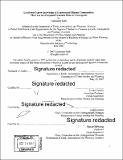| dc.contributor.advisor | JoAnn Carmin and Samuel Browring. | en_US |
| dc.contributor.author | Roth, Cassandra (Cassandra B.) | en_US |
| dc.contributor.other | Massachusetts Institute of Technology. Department of Urban Studies and Planning. | en_US |
| dc.date.accessioned | 2018-03-27T14:17:55Z | |
| dc.date.available | 2018-03-27T14:17:55Z | |
| dc.date.copyright | 2007 | en_US |
| dc.date.issued | 2007 | en_US |
| dc.identifier.uri | http://hdl.handle.net/1721.1/114333 | |
| dc.description | Thesis: S.B., Massachusetts Institute of Technology, Department of Earth, Atmospheric, and Planetary Sciences, 2007. | en_US |
| dc.description | Thesis: S.B., Massachusetts Institute of Technology, Department of Urban Studies and Planning, 2007. | en_US |
| dc.description | Cataloged from PDF version of thesis. | en_US |
| dc.description | Includes bibliographical references (pages 51-53). | en_US |
| dc.description.abstract | Public access to science is an essential environmental justice component of any mining development. Both limited public access to professional scientific knowledge and little acknowledgment by professionals of the contributions of local knowledge hinder discussion of proposed mines. A proposed uranium mine in Crownpoint, New Mexico, a predominantly Navajo community, presents a case for studying the role of expert and local knowledge in the individual's perception of the risks and benefits associated with the mine. Interviews, supplemented with numerous Nuclear Regulatory Commission documents and other articles of the public record, were used to understand how people developed their personal understanding of the trade-offs of mining uranium in their town. This research reveals that family experiences and personal observations are correlated with individual perception of risk, but the perception of uncertainty is related the group of experts available to the individual. The results suggest that individuals in such communities should have access to a range of experts and that local knowledge and experiences should be taken into account when journalists, industry representatives and government officials translate expert knowledge for public consumption. | en_US |
| dc.description.statementofresponsibility | by Cassandra Roth. | en_US |
| dc.format.extent | 58 pages | en_US |
| dc.language.iso | eng | en_US |
| dc.publisher | Massachusetts Institute of Technology | en_US |
| dc.rights | MIT theses are protected by copyright. They may be viewed, downloaded, or printed from this source but further reproduction or distribution in any format is prohibited without written permission. | en_US |
| dc.rights.uri | http://dspace.mit.edu/handle/1721.1/7582 | en_US |
| dc.subject | Earth, Atmospheric, and Planetary Sciences. | en_US |
| dc.subject | Urban Studies and Planning. | en_US |
| dc.title | Local and expert knowledge in experienced mining communities : the case of a proposed uranium mine in Crownpoint | en_US |
| dc.type | Thesis | en_US |
| dc.description.degree | S.B. | en_US |
| dc.contributor.department | Massachusetts Institute of Technology. Department of Earth, Atmospheric, and Planetary Sciences | |
| dc.contributor.department | Massachusetts Institute of Technology. Department of Urban Studies and Planning | |
| dc.identifier.oclc | 1028748978 | en_US |
